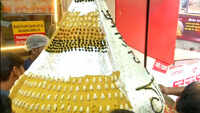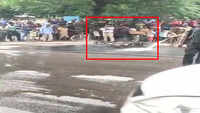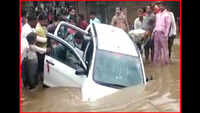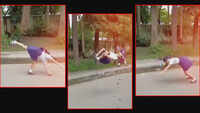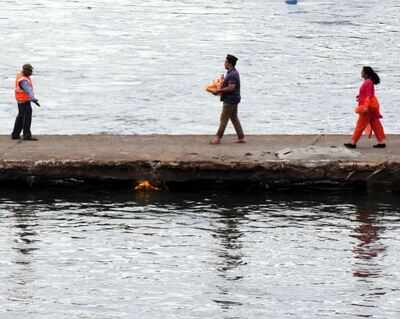
PUNE: Shailaja Deshpande, representing an NGO working for river restoration, believes the festival period is the worst time for environmentalists.
"This is the time when we have the most work cut out for us," said Deshpande, the founder-president of Jeevitnadi. The members of the NGO have been getting together over the weekends in the past few years to clear up the river banks on a regular basis. However, with the ongoing immersions, members are worried about the condition along the rivers.
The members have come up with an action plan at immersion sites in Aundh and Vitthalwadi. "We will conduct awareness drives along Vitthalwadi near Mutha river and at Rajiv Gandhi bridge in Aundh along Mula river," she said.
The NGO's volunteers have been stationed at the ghats over the last two years. "This time, we have also collaborated with Solid Waste Collection and Handling (SWaCH) to ensure nothing is immersed in the rivers. Wherever SWaCH workers will be present, they will request devotees to separate nirmalaya and other material that they bring along for immersion," Deshpande explained.
At Aundh, Jeevitnadi volunteers will work in shifts from 5pm to 10pm on September 7, 8, and 12. "We have associated with Inora, an organization that undertakes composting, for a live demonstration. We will give a certificate and a native tree sapling from Jeevitnadi to those making use of the immersion tanks," Deshpande added.
Jeevitnadi member Bhushan Shelke, who runs a nursery opposite AIIMS hospital at the Rajiv Gandhi bridge, has also voluntarily kept a tank in the premises for people to immerse idols. "He will also be accepting idols from those who want to donate them," Deshpande said.
Adish Barve, a Jeevitnadi member who works along the Vitthalwadi stretch, said awareness activities had been planned. "Our volunteers will be around the stretch between 3pm and 8pm on September 7 and 12. We will work with SWaCH workers, urging people to give the nirmalaya to workers and immerse idols in PMC's water tanks," he said.
Anil Gaikwad, an environmentalist and retired scientist from the National Chemical Laboratory (NCL) has worked extensively along the Ramnadi stretch in Baner. He plans to launch a campaign about safe idol immersion measures. "We have spoken to the NCL about a way they had devised a few years ago, where the plaster of Paris idol can be dissolved in an ammonium bicarbonate solution. The idol takes about four days to dissolve leaving a calcium carbonate sludge. The liquid residue can be used as a fertilizer. We will try to raise awareness about this," he said.
Gaikwad added that clay idols are not all that safe as is the common belief. "Shadu or clay idols are not actually safe as against common belief. This is one of the main aspects we are campaigning about. The clay idols needs to be small, only then is it safe for immersion," he said.
"This is the time when we have the most work cut out for us," said Deshpande, the founder-president of Jeevitnadi. The members of the NGO have been getting together over the weekends in the past few years to clear up the river banks on a regular basis. However, with the ongoing immersions, members are worried about the condition along the rivers.
The members have come up with an action plan at immersion sites in Aundh and Vitthalwadi. "We will conduct awareness drives along Vitthalwadi near Mutha river and at Rajiv Gandhi bridge in Aundh along Mula river," she said.
The NGO's volunteers have been stationed at the ghats over the last two years. "This time, we have also collaborated with Solid Waste Collection and Handling (SWaCH) to ensure nothing is immersed in the rivers. Wherever SWaCH workers will be present, they will request devotees to separate nirmalaya and other material that they bring along for immersion," Deshpande explained.
At Aundh, Jeevitnadi volunteers will work in shifts from 5pm to 10pm on September 7, 8, and 12. "We have associated with Inora, an organization that undertakes composting, for a live demonstration. We will give a certificate and a native tree sapling from Jeevitnadi to those making use of the immersion tanks," Deshpande added.
Jeevitnadi member Bhushan Shelke, who runs a nursery opposite AIIMS hospital at the Rajiv Gandhi bridge, has also voluntarily kept a tank in the premises for people to immerse idols. "He will also be accepting idols from those who want to donate them," Deshpande said.
Adish Barve, a Jeevitnadi member who works along the Vitthalwadi stretch, said awareness activities had been planned. "Our volunteers will be around the stretch between 3pm and 8pm on September 7 and 12. We will work with SWaCH workers, urging people to give the nirmalaya to workers and immerse idols in PMC's water tanks," he said.
Anil Gaikwad, an environmentalist and retired scientist from the National Chemical Laboratory (NCL) has worked extensively along the Ramnadi stretch in Baner. He plans to launch a campaign about safe idol immersion measures. "We have spoken to the NCL about a way they had devised a few years ago, where the plaster of Paris idol can be dissolved in an ammonium bicarbonate solution. The idol takes about four days to dissolve leaving a calcium carbonate sludge. The liquid residue can be used as a fertilizer. We will try to raise awareness about this," he said.
Gaikwad added that clay idols are not all that safe as is the common belief. "Shadu or clay idols are not actually safe as against common belief. This is one of the main aspects we are campaigning about. The clay idols needs to be small, only then is it safe for immersion," he said.
Quick Links
Lok Sabha Election Schedule 2019Lok Sabha Election NewsDelhi Capitals teamMI team 2019Rajasthan Royals 2019RCB team 2019Maharashtra Lok Sabha ConstituenciesBJP Candidate ListBJP List 2019 TamilnaduShiv Sena List 2019AP BJP List 2019Mamata BanerjeeBJP List 2019 MaharashtraPriyanka GandhiBJP List 2019 KarnatakaAMMK Candidate List 2019BJP List 2019 WBLok Sabha Elections in Tamil NaduBSP List 2019 UPNews in TamilLok Sabha Poll 2019Satta Matka 2018PM ModiMahagathbandhanNagpur BJP Candidate ListChandrababu NaiduTamil Nadu ElectionsUrmila MatondkarNews in TeluguMadras High CourtTejashwi YadavArvind KejriwalTejasvi SuryaPawan KalyanArvind KejriwalYogi AdityanathJaya PradaSatta King 2019Srinagar encounter
Get the app
